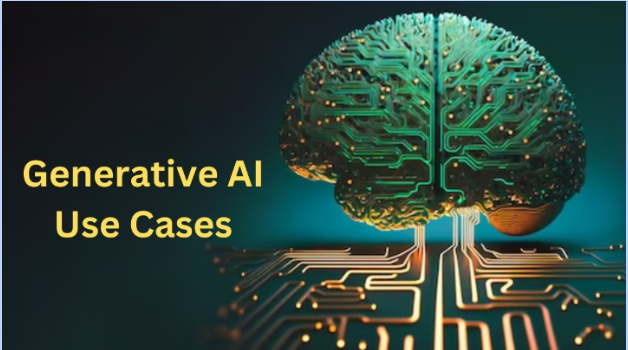The rise of Artificial Intelligence has wielded a transformative influence on the landscape of business operations and workflow management. The proliferation of diverse AI applications and tools has empowered businesses to refine decision-making processes and automate repetitive tasks, enhancing overall operational efficiency. In the vast expanse of AI algorithms, generative AI has emerged as a notable player cutting across various industries.
With the ascendancy of prominent generative AI, businesses are now equipped with the capability to generate novel ideas, content, and solutions swiftly. This acceleration in creative processes refines decision-making and streamlines operations, enabling businesses to maintain competitiveness in a dynamic market. This article delves into the myriad use cases and applications of generative AI across diverse industry domains, exploring its transformative influence on business operations and innovation.
Generative AI Use Cases
Generative AI, with its multifaceted capabilities, has found diverse applications across several industries, transforming traditional processes and driving innovation. Below, we explore specific use cases of Generative AI in different sectors, showcasing its substantial impact.
Manufacturing:
- Production Processes: Generative AI is ushering in a paradigm shift in manufacturing by optimizing production processes. Manufacturers leverage this technology to streamline workflows and enhance efficiency, resulting in improved productivity and reduced operational costs.
- Product Design: The real-time analysis capabilities of Generative AI empower manufacturers to iterate designs rapidly. This leads to the creation of more innovative, cost-effective, and efficient product designs that align with market demands and customer expectations.
- Predictive Maintenance: Generative AI’s predictive maintenance capabilities reduce downtime and minimize production costs by anticipating equipment maintenance needs. Manufacturers can proactively address issues, ensuring uninterrupted production and maximizing the lifespan of machinery.
- Quality Control: In ensuring customer satisfaction, Generative AI plays a pivotal role in quality control. Identifying and rectifying potential issues in the manufacturing process ensures higher output quality, contributing to brand reputation and customer loyalty.
- Innovative Applications: Generative AI streamlines existing manufacturing workflows and paves the way for entirely new approaches. Manufacturers can simulate various production scenarios, fostering innovation in production and design and staying ahead in a competitive market.
Automotive:
- Vehicle Designing: Generative AI plays a pivotal role in transforming vehicle design. Designers leverage Gen AI to create innovative and aerodynamic designs, enhancing vehicles’ aesthetic and functional aspects. This results in vehicles that are visually appealing, fuel-efficient, and performance-oriented.
- Smarter, Safer Vehicles: Manufacturers deploy Generative AI to improve production efficiency, reduce costs, and create smarter and safer vehicles. The technology contributes significantly to developing autonomous driving systems, ensuring safety, efficiency, and adherence to regulatory standards.
- Simulation-Based Design: Through simulation-based design processes, Generative AI enables the creation of vehicles that exceed industry standards. It considers fuel efficiency and safety factors, resulting in vehicles that meet and surpass customer expectations. This approach minimizes design flaws and enhances overall product quality.
Supply Chain:
- Predicting Demand Patterns: Generative AI transforms supply chain management by predicting demand patterns. Businesses leverage AI to forecast demand accurately, ensuring optimal inventory levels and minimizing excess costs. This enhances operational efficiency and contributes to customer satisfaction by avoiding stockouts or overstock situations.
- Real-Time Route Optimization: The technology facilitates real-time route optimization in the supply chain, minimizing transportation costs and enhancing overall agility. By considering factors like traffic conditions, weather, and fuel efficiency, Generative AI in supply chain ensures timely and efficient delivery of goods, contributing to a seamless logistics process.
- Efficiency: Generative AI serves as a game-changer in the dynamic supply chain landscape. Its predictive capabilities and data-driven insights minimize the risk of overstock or stockouts, setting new standards for efficiency and responsiveness in supply chain operations.
- Smart Warehouses: Generative AI contributes to the efficiency of supply chain operations by optimizing processes in smart warehouses. AI-driven machines streamline picking and packing, reducing order fulfillment times and improving overall warehouse productivity.
Banking and Finance:
- Customer Experiences: Generative AI is at the forefront of digital transformation in banking and finance, enhancing customer experiences. The technology enables personalized services by analyzing customer behavior and preferences. This leads to tailored product recommendations, targeted communication, and an overall improvement in customer satisfaction and loyalty.
- Personalized Services: In customer experiences, Generative AI empowers banks and financial institutions to provide highly personalized services. By understanding customer behavior, preferences, and financial history, AI algorithms facilitate tailored product recommendations and targeted communication, fostering stronger customer relationships.
- Accurate Risk Assessments: Generative AI’s ability to analyze vast datasets in real time enhances risk management in the financial sector. The technology ensures more accurate risk assessments and predictions, contributing to a secure and customer-centric financial ecosystem. This results in more informed decision-making regarding loans, investments, and other financial transactions.
Logistics:
- Real-Time Route Optimization: Generative AI modifies logistics by facilitating real-time route optimization. Businesses can minimize transportation costs, reduce delivery times, and enhance supply chain efficiency by leveraging AI algorithms considering traffic conditions and fuel efficiency factors.
- Predictive Maintenance: The technology contributes to predictive maintenance for transportation fleets. By analyzing historical and real-time data, Generative AI predicts maintenance needs, ensuring the reliability of transportation infrastructure. This proactive approach minimizes the risk of breakdowns and ensures timely deliveries.
- Smart Demand Forecasting: Generative AI enables intelligent demand forecasting in logistics. By analyzing consumer behavior, market trends, and historical sales data, businesses can optimize inventory levels and ensure that products are available when and where they are needed. This minimizes excess inventory, reduces stockouts, and improves overall supply chain agility.
Legal Businesses:
- Streamlining Legal Tasks: Generative AI streamlines time-consuming legal tasks, offering valuable support in legal research, contract review, and document analysis. By automating routine tasks, legal professionals can focus on strategic and complex aspects of their work, improving overall efficiency and accuracy.
- Efficiency in Legal Research: In legal research, Generative AI excels at processing vast amounts of data quickly and accurately. The technology analyzes cases, statutes, and precedents to provide legal professionals with relevant information efficiently, enhancing the speed and accuracy of legal processes.
- Contract Review Automation: Generative AI automates contract review processes, quickly identifying key clauses and ensuring compliance with legal standards. This speeds up the contract review process, reduces the risk of oversights, and improves the overall efficiency of legal operations.
Customer Support:
- Virtual Assistant Support: Generative AI transforms customer support through virtual assistants, offering instant and personalized support. These Gen AI-powered assistants use natural language processing to understand and respond to customer queries effectively, providing a more seamless and efficient customer support experience.
- Enhanced Customer Satisfaction: By automating routine inquiries and providing quick, accurate responses, Generative AI enhances customer satisfaction. Human agents can focus on handling complex issues, creating a more efficient and seamless customer support experience. The constant progress driven by AI analysis of customer interactions and sentiment further refines support systems.
- Continuous Improvement: Generative AI’s ability to analyze customer interactions and sentiment enables businesses to improve support systems continually. Insights derived from data contribute to refining products, services, and customer-centric strategies, ensuring that customer support processes evolve with changing needs and preferences.
Insurance:
- Informed Decision-Making: Generative AI transforms various aspects of insurance operations, enabling more informed decision-making. The technology analyzes vast datasets from underwriting processes to claims management and fraud detection for enhanced efficiency. AI-driven insights contribute to a more accurate understanding of risks and improved decision-making in insurance operations.
- Comprehensive Risk Assessment: In underwriting, AI-powered systems assess risk factors comprehensively, leading to more accurate premium calculations and risk assessments. This contributes to a more precise understanding of risks and ensures that insurance coverage aligns with the actual level of risk. The result is a more efficient and customer-centric insurance ecosystem.
- Efficient Claims Management: Generative AI expedites claims management by automating routine processes. By processing claims quickly, legitimate claims are settled promptly, and potential fraudulent claims are flagged for investigation. This improves operational efficiency and enhances customer satisfaction by providing a seamless claims experience.
Healthcare:
- Diagnostic Accuracy: Generative AI contributes to diagnostic accuracy in healthcare, particularly in medical imaging. AI’s ability to analyze complex visual data enhances early detection and precise diagnoses, leading to more effective treatment plans and improved patient outcomes.
- Personalized Treatment Plans: The technology allows for personalized treatment plans by analyzing a patient’s genetic makeup and medical history. This precision medicine approach improves treatment efficacy and minimizes potential side effects, offering patients more targeted and effective healthcare interventions.
- Accelerated Drug Discovery: Generative AI accelerates drug discovery processes by analyzing vast datasets. AI algorithms identify potential drug candidates more efficiently, expediting the development of new therapies. This reduces the time and cost associated with drug discovery and opens new possibilities for innovative treatments.
Conclusion
Generative AI stands as a catalyst for unprecedented advancements across industries, reshaping business landscapes from manufacturing processes to customer support. The synergy of data, machine learning, and human expertise ushers in a new era of efficiency and innovation. With ongoing impact and limitless potential, Generative AI promises to redefine technology and business practices globally. As industries evolve, the collaboration of human ingenuity and AI continues to set new standards for efficiency, innovation, and customer satisfaction. In this ever-changing tech history, Generative AI emerges as both a tool and a partner, shaping the future across diverse sectors.













